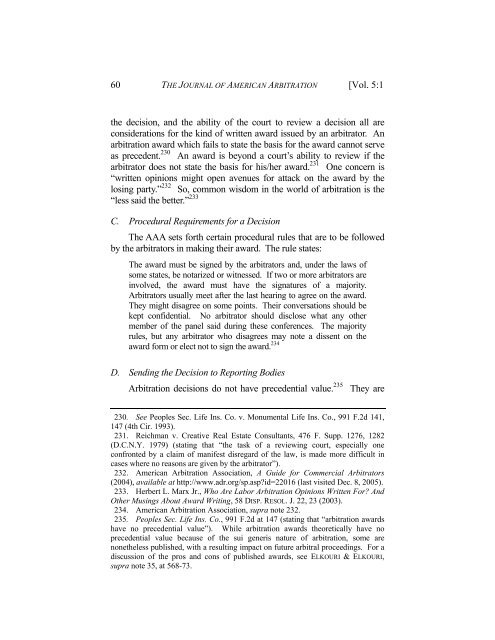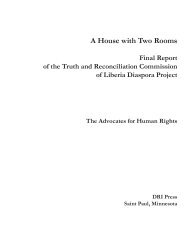2006/Vol. 5 No.1 - Hamline Law - Hamline University
2006/Vol. 5 No.1 - Hamline Law - Hamline University
2006/Vol. 5 No.1 - Hamline Law - Hamline University
You also want an ePaper? Increase the reach of your titles
YUMPU automatically turns print PDFs into web optimized ePapers that Google loves.
60 THE JOURNAL OF AMERICAN ARBITRATION [<strong>Vol</strong>. 5:1<br />
the decision, and the ability of the court to review a decision all are<br />
considerations for the kind of written award issued by an arbitrator. An<br />
arbitration award which fails to state the basis for the award cannot serve<br />
as precedent. 230 An award is beyond a court’s ability to review if the<br />
arbitrator does not state the basis for his/her award. 231 One concern is<br />
“written opinions might open avenues for attack on the award by the<br />
losing party.” 232 So, common wisdom in the world of arbitration is the<br />
“less said the better.” 233<br />
C. Procedural Requirements for a Decision<br />
The AAA sets forth certain procedural rules that are to be followed<br />
by the arbitrators in making their award. The rule states:<br />
The award must be signed by the arbitrators and, under the laws of<br />
some states, be notarized or witnessed. If two or more arbitrators are<br />
involved, the award must have the signatures of a majority.<br />
Arbitrators usually meet after the last hearing to agree on the award.<br />
They might disagree on some points. Their conversations should be<br />
kept confidential. No arbitrator should disclose what any other<br />
member of the panel said during these conferences. The majority<br />
rules, but any arbitrator who disagrees may note a dissent on the<br />
award form or elect not to sign the award. 234<br />
D. Sending the Decision to Reporting Bodies<br />
Arbitration decisions do not have precedential value. 235 They are<br />
230. See Peoples Sec. Life Ins. Co. v. Monumental Life Ins. Co., 991 F.2d 141,<br />
147 (4th Cir. 1993).<br />
231. Reichman v. Creative Real Estate Consultants, 476 F. Supp. 1276, 1282<br />
(D.C.N.Y. 1979) (stating that “the task of a reviewing court, especially one<br />
confronted by a claim of manifest disregard of the law, is made more difficult in<br />
cases where no reasons are given by the arbitrator”).<br />
232. American Arbitration Association, A Guide for Commercial Arbitrators<br />
(2004), available at http://www.adr.org/sp.asp?id=22016 (last visited Dec. 8, 2005).<br />
233. Herbert L. Marx Jr., Who Are Labor Arbitration Opinions Written For? And<br />
Other Musings About Award Writing, 58 DISP. RESOL. J. 22, 23 (2003).<br />
234. American Arbitration Association, supra note 232.<br />
235. Peoples Sec. Life Ins. Co., 991 F.2d at 147 (stating that “arbitration awards<br />
have no precedential value”). While arbitration awards theoretically have no<br />
precedential value because of the sui generis nature of arbitration, some are<br />
nonetheless published, with a resulting impact on future arbitral proceedings. For a<br />
discussion of the pros and cons of published awards, see ELKOURI & ELKOURI,<br />
supra note 35, at 568-73.
















